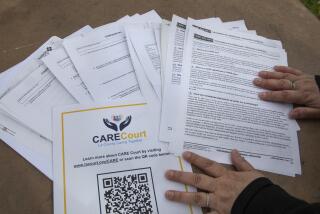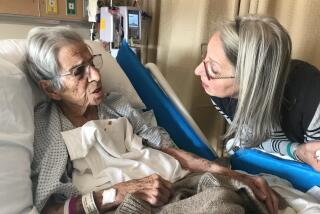More Patients, and Their Advocates, Check In
- Share via
In an era of hospital cost-cutting, when nursing staffs are stretched and bedside checks can be infrequent, patients increasingly need someone to look out for them. Ask Kay McVay, who credits her presence and persistence during her husband’s hospital stay last spring with saving his life.
Richard McVay was five days into a 17-day hospital stay for quadruple-bypass surgery last spring when Kay noticed something amiss. Her 66-year-old husband, who also had lung damage from years of heavy smoking, was uncharacteristically sleepy and ornery. A registered nurse, Kay knew enough to demand that somebody measure the oxygen level in Richard’s blood: It was less than half of what it should be.
“He wasn’t getting the respiratory therapy he needed” to speed his recovery, says McVay, also 66, who had the advantage of 40 years of nursing experience when she went to bat for her husband. She believes the neglect he endured at a Northern California hospital stemmed from skimpy staffing: One registered nurse, one licensed vocational nurse and one aide were responsible for 16 patients.
Such staffing crunches, combined with the reality that more hospital beds are filled with sicker patients today, have fueled a need for family or friend advocates who can offer comfort and assure a patient gets proper medical attention.
Advocates “need to ask the hard questions,” advises McVay, a Concord resident who is also president of the California Nurses Assn., a labor union. “You need to say, ‘Shouldn’t he be getting therapy? Shouldn’t people be coming in here?’ ”
Most often, patients “are not focused on everything going on around them. They’re worried about being sick, being in pain,” says Peter Lee, executive director of the Center for Health Care Rights in Los Angeles. “A family member can take notes and watch to see that patients get the right care.”
Although McVay was assertive and demanding during those touch-and-go days in March and April, she advises advocates to make themselves heard without alienating hospital staff. In return, she says, hospitals must recognize patient advocates as allies. More and more are providing chairs that convert into sleeping couches or other accommodations for those who wish to be nearby at all hours.
“I don’t want the family to be told they can’t be there,” McVay says. “It helps the patient actually if they do have the family with them.”
No Written Laws Govern Advocacy
Although advocates are an increasing presence on hospital corridors, there are no written laws governing their conduct or that of the hospital, although institutional regulations may seem as imposing as law.
Patient advocates “can do anything and everything” in accord with the patient’s wishes, contends Charles Inlander, president of the People’s Medical Society, a 125,000-member consumer advocacy group based in Allentown, Pa. “You have the right to have anybody you want with you at the hospital 24 hours a day, seven days a week. The only proviso is that those people cannot get in the way of the ability to deliver medical care.”
If they hinder the work of doctors, nurses or other medical workers, Inlander says, the hospital has the right to oust them from the facility.
By remaining respectful of limits, however, advocates can be very effective in garnering needed attention, Inlander says.
“We’re the greasy wheel. We get the grease.”
He cites many ways in which advocates can be lifesavers:
* They can monitor medication given to the patient. He cited findings that 2% to 3% of the drugs provided to hospital patients are delivered improperly. That means patients got the wrong drug, the wrong dose or the right drug at the wrong time.
Inlander saved his father from such a mistake this past summer. Advanced Alzheimer’s disease had destroyed his dad’s ability to swallow and led to intravenous feedings. Yet one day, Inlander recalled, “in walks a nurse with a handful of pills and says to him, ‘Take them.’ If I wasn’t there, he probably would have choked to death.”
* They can monitor adherence to infection control rules by reporting incidents when health care workers don’t wash their hands or fail to don new gloves with each patient.
* They can provide a needed sense of continuity in an environment featuring revolving brigades of nurses, doctors and health aides. The hospital staff “can’t tell how you were yesterday and how you are today. They don’t know the nuances,” Inlander says. “It really requires a family member or friend to say, ‘She’s having a lot more problems today than yesterday.’ ”
Inlander has heard of just a few cases in which hospital officials have challenged the right of a friend or loved one to be with the patient.
He recalled a case more than a decade ago in which a Michigan state legislator accompanied his girlfriend to a hospital emergency room. Hospital workers wanted him to leave. He insisted that because the woman was unconscious, he should be allowed to stay and explain what had befallen her. Although they kicked him out, he sued and won, Inlander says. After that incident, the hospital was told to inform friends of family that they could accompany the patient into the emergency room.
Hospitals and doctors are becoming more receptive to advocates, says George Annas, a health law professor at the Boston University School of Public Health. “Ten to 15 years ago, it used to be hard to stay with a patient 24 hours a day. Not anymore,” he says. In addition, many doctors now recognize the value of communicating with more than just the patient. “In many cases,” he says, “it’s a lot easier for them to discuss this stuff with a relative than the patient. They’re not as emotionally involved.”
Annas also sees the advocate as a buffer “more likely to keep problems from escalating, more likely to defuse problems at the first opportunity rather than create them.”
Advocates Do Not Deliver Medical Care
There are several ways that advocates can make their presence welcome.
Lee suggests they remember that cuts often hit the nursing staff “as hard or harder than anywhere else in the health care system” and ask for a schedule of each day’s routines. That eases the burden on nurses, who “don’t need to explain every single time they come in.”
Advocates also should understand they are not there to deliver medical care.
“They’ve never gone to nursing school. They’ve never gone to medical school. They haven’t got a clue what they need to do or what they need to be looking for,” says McVay.
But, suggests Lee, “what someone can do is . . . be the eyes, ears and often the mouth for the patient, rather than try to take the place of the nurse or the doctor.”
If institutions allow non-hospital personnel to provide health care, they take on liability, according to Jim Lott, a spokesman for the Healthcare Assn. of Southern California, which represents 220 hospitals.
Official Recognition Only for Next of Kin
So just how much power does that leave an advocate? A parent or legal guardian has total control over care of children or adults not competent to make their own decisions. A friend or family member given power of attorney by an adult patient has control over medical decisions. But in the absence of formal arrangements, hospitals tend to recognize only next-of-kin. That often poses a problem for friends or lovers not covered by a legal document.
McVay is sympathetic to those people. As an intensive care unit nurse working with AIDS patients, she strives to make sure their companions aren’t engaged in conflicts with the family: “There are many times I would call and get one of the priests to come over and try to work with the family to let the significant other come into the hospital.”
Donna Vanik, a social worker on the oncology floor of Huntington Memorial Hospital in Pasadena, says that if the advocate isn’t a relative, hospital workers look for power-of-attorney documents. Social workers can assist with obtaining the forms.
Sometimes the problem is dealing with too many people at once, especially in large or extended families.
McVay says she has encountered several cultures where this is an issue.
“If you’re going to be sensitive to cultural diversity, you have to be able to make some adjustments,” she suggests.
“It’s hard if you’ve got an extended family of 12 and all want to be there all the time to not be in the way,” Lee adds. He says advocates need to recognize that in a hospital, they “are on someone else’s turf” and suggests that families designate a single family liaison for particular times.
More to Read
Sign up for Essential California
The most important California stories and recommendations in your inbox every morning.
You may occasionally receive promotional content from the Los Angeles Times.













